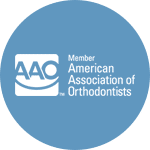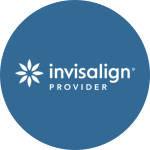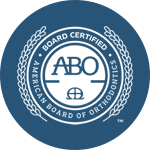Do you charge for an initial visit?
No, we don’t charge for the initial visit. As a courtesy to you and your family dentist, we will discuss the feasibility of braces or tooth straightening without any fee for the initial evaluation.
At what age do you start seeing patients?
We usually begin seeing young patients when their 6-year molars start coming in, and their front permanent teeth begin to appear, usually between the ages of 6 and 8. The American Association of Orthodontics recommends that all children have their first orthodontic check-up by the age of 7.
Why do you evaluate patients so young?
Early evaluation is mainly for gathering information and observing rather than providing immediate treatment. At this stage, we can identify and discuss potential future needs. Some children may need early intervention for habits or medical issues or to establish an observation schedule until they are ready for treatment.
How long will the first visit take?
The initial visit can last from 30 minutes to 1 hour, depending on the patient’s readiness for treatment. We may conduct a visual exam, suggest X-rays, and complete diagnostics, including a scan of the teeth and photographs to document the current position.
Do you take patients transferring from out of town?
Yes, we welcome patients transferring from other cities. We treat them as new patients, gathering complete diagnostic records to understand their current status and propose a treatment plan to complete their orthodontic work.
Do you have any adult patients?
Absolutely, an increasing number of our patients are adults. Advances in cosmetic orthodontic appliances have made adult treatment more comfortable and convenient.
What is the difference between an orthodontist and a dentist?
An orthodontist is a general dentist who has completed at least two additional years of full-time orthodontic training to earn a specialty certificate. Orthodontists specialize in aligning teeth and dentofacial orthopedics. Dr. Schiro is a Board-Certified Orthodontist.
Can I make all my appointments in the afternoon and late after school?
We make every effort to accommodate your family’s schedule. Our regular work week is Monday to Thursday, with appointments available from 7:30 AM to 1:00 PM and 2:00 PM to 5:00 PM. We also have a limited number of appointments at 7:00 AM and late consultations at 5:00 PM. To better accommodate your busy schedules, we are open one Friday each month. Please check with our team to find out which Friday we will be in the office.
Do you see patients for emergencies?
Yes, we provide emergency care. Visit our website for contact information regarding emergencies. Please refer to our emergency care page for further details.
Can we make payments?
Yes, we offer convenient payment plans regardless of whether you have insurance or a dental plan. These plans are structured to coincide with your treatment plan.
How do you handle insurance?
After we confirm your coverage, we will bill and collect payment from your insurance provider. However, please note that if your coverage changes or ends, you will still be responsible for the agreed-upon fee.
Do you take American Express, Master Card, and/or Visa?
Yes, we accept all major credit cards.
Do you have direct debit?
Yes, we offer arrangements for direct debit, charge card posting, and online payments.
Do you charge interest?
No, we do not charge interest.
Do you give family discounts?
Yes, we have special programs and fees for multiple patients from the same family.
Do retainers need to be worn after braces?
Retainers should be worn full-time for about 3 months, followed by indefinite nighttime wear to maintain orthodontic treatment results. Remember our favorite catchphrases: 1. “Nighttime for a lifetime!” and 2. “Retainers: in your face or in your case!“
Why do teeth get crooked after wearing braces or aligners?
Teeth naturally shift throughout life, even after wearing braces. This is part of the aging process. To maintain orthodontic results over a lifetime, it is recommended that you wear a retainer continuously.
All About Braces
Brushing and Flossing
Why It’s Important: Maintaining excellent oral hygiene is crucial when you have braces. Regular brushing and flossing ensure your teeth and gums remain healthy throughout your orthodontic treatment.
Poor oral hygiene can lead to more frequent visits to the dentist for cleanings. If you have a history of gum disease, seeing a periodontist during treatment is recommended.
Watch the video below for tips on the proper care of braces during orthodontic treatment.
Eating with Braces
Initial Diet: Stick to soft foods for the first day or so. As you adjust, you can gradually add more foods back into your diet.
Foods to Avoid
To protect your braces, steer clear of these:
- Chewy Foods: Taffy, fruit leather, beef jerky
- Crunchy Foods: Chips, hard pretzels
- Sticky Foods: Gummy bears, toffee
- Hard Foods: Raw nuts, hard taco shells
- Foods You Bite Into: Whole pears, uncut sandwiches, raw celery
Tip: Avoid chewing on hard objects like pens, pencils, or fingernails, as this can damage your braces and prolong your treatment.
Managing Discomfort
General Soreness:
You might feel some soreness in your mouth and tenderness in your teeth for a few days after getting your braces. Over-the-counter pain relievers like Tylenol can help. Lips, cheeks, and tongue irritation can last for 1-2 weeks as they adjust. We provide wax to place on braces in irritated areas to reduce discomfort.
Loose Teeth:
It’s normal for your teeth to feel loose throughout your treatment. This allows them to move into their new positions. Your teeth will stabilize once treatment is completed.
Loose Wire or Band:
If a wire or band comes loose, don’t worry. Use the eraser end of a pencil to gently push it back under the archwire. If irritation persists, apply wax or wet cotton to the wire. Contact our office promptly to schedule a repair appointment.
Rubber Band Wear
Cooperation with Dr. Schiro and Dr. Mazurek is essential for successful orthodontic treatment. Consistently wearing rubber bands and other appliances as prescribed is crucial for your teeth and jaws to move to their correct positions. Not following instructions or damaging your appliances can extend your treatment time.
Sports and Braces
Playing Sports: If you participate in any physical activities that involve contact, it is important to inform us so we can provide you with a protective mouthguard. Wearing a mouthguard will help protect your braces and teeth from injury while playing sports.



